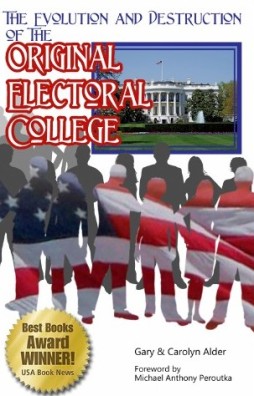A Page from Our Book
Version 2 – THE EVOLUTION
Page 49 – Political Parties Rise to Power
Although the popular election of a president had been considered and rejected by the Framers during the Constitutional Convention, the idea persisted among the people. The popular election of a president leads to a consolidated and often paternalistic government. The concept of addressing separate and conflicting interests in a way to satisfy both, gives way to accommodating only the will of the majority. In spite of the efforts of the Framers to construct the best method of electing a president and vice-president by a procedure that would not be subject to the sinister designs of scheming groups of men, this very phenomenon (which is characteristic of party-based parliamentary governments) began working its way into the new American government almost from the beginning. George Washington could see that it was happening. In his farewell address dated September 17, 1796, Washington warned the country about the danger—but to no avail:
I have already intimated to you the danger of Parties in the State, with particular reference to the founding of them on Geographical discriminations. Let me now take a more comprehensive view, and warn you in the most solemn manner against the baneful effects of the Spirit of Party, generally.
This spirit, unfortunately, is inseparable from our nature, having its root in the strongest passions of the human Mind. It exists under different shapes in all Governments, more or less stifled, controuled, or repressed; but, in those of the popular form it is seen in its greatest rankness and is truly their worst enemy.
The alternate domination of one faction over another, sharpened by the spirit of revenge natural to party dissension, which in different ages and countries has perpetrated the most horrid enormities, is itself a frightful despotism. But this leads at length to a more formal and permanent despotism. The disorders and miseries, which result, gradually incline the minds of men to seek security and repose in the absolute power of an Individual; and sooner or later the chief of some prevailing faction more able or more fortunate than his competitors, turns this disposition to the purposes of his own elevation on the ruins of Public Liberty.
Without looking forward to an extremity of this kind (which nevertheless ought not to be entirely out of sight) the common and continual mischiefs of the spirit of Party are sufficient to make it the interest and the duty of a wise People to discourage and restrain it.
It serves always to distract the Public Councils and enfeeble the Public administration. It agitates the Community with ill founded jealousies and false alarms, kindles the animosity of one part against another, foments occasionally riot and insurrection. It opens the door to foreign influence and corruption, which find a facilitated access to the government itself through the channels of party passions. Thus the policy and the will of one country are subjected to the policy and will of another.
There is an opinion that parties in free countries are useful checks upon the Administration of the Government and serve to keep alive the spirit of Liberty. This within certain limits is probably true, and in Governments of a Monarchical cast Patriotism may look with indulgence, if not with favour, upon the spirit of party. But in those of the popular character, in Governments purely elective, it is a spirit not to be encouraged. From their natural tendency, it is certain there will always be enough of that spirit for every salutary purpose. And there being constant danger of excess, the effort ought to be, by force of public opinion, to mitigate and assuage it. A fire not to be quenched; it demands a uniform vigilance to prevent its bursting into a flame, lest instead of warming it should consume. (George Washington Collection p. 519-520)


